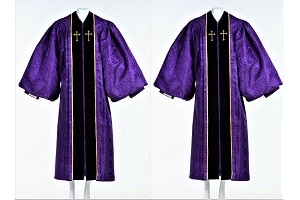A Brief History of Women’s Clergy Wear and Other Garb
In more recent years, it has become quite common for women in the Christian clergy to be found wearing clerical collars and shirts while running their errands or even while leading mass. Many women of the clergy also wear other outfits, like women’s clergy dresses, skirts, suits, and so on. Not many people even bat an eye when they recognize them and their role in the church.

However, it hasn’t always been the case that women were so welcomed into the clergy regardless of what they wore. Women haven’t been ordained in various churches for very long, as they were typically banned from doing so for centuries prior to recently. In fact, the first time women were able to be ordained in the church was just in the early 19th century when the Quakers (Society of Friends) allowed it to be so.
But how exactly did their attire alter throughout time and what pieces did their outfits typically include? Let’s take a look at just five pivotal changes in women’s clergy wear and other garb.
1. Quaker women were allowed to be ordained as deacons, preachers, and ministers (the first occurrence of it in the Christian church) in the early 19th century. They were able to even travel on their very own and preach the word of God. Clergywomen wore blue, which was a symbol of feminine service and the suffering of the Virgin Mary.
2. Women who were appointed as deaconesses in the United Church of Christ wore simple black dresses with a white collar. This outfit was most popular as casual outfits. When working in hospitals and parishes, however, they added white aprons and hats. This attire change for clergywomen was important because it was the first popular outfit for women of the cloth but also it inspired the classic nurse’s outfit as well. Other denominations adopted this look for their clergywomen as well.
3. Fitted blouses eventually became far more popular for women of the clergy due to the lack of comfort they felt when wearing the popular clerical shirts and collars for so long. This is due to the fact that these shirts were made with men in mind, so when they wore them, the shirts offered women the look of boys instead of higher-ranking powerful and feminine women. Women then crafted their own fitted blouses to free themselves from such discomfort. They even made their own dickies to wear beneath various other pieces of clothing.
4. Clergywomen, as you might have already assumed, had originally taken on the look that the clergymen wore since their outfit choices were so customary. However, as time passed, the women wanted to add a flair of femininity to their attire. That was when they started to wear long skirts and women’s clergy dresses as well. They often would pair their clerical shirts with either pants (as the clergymen did) or their own long skirts as well. It was a pivotal moment for clergywomen as they had their own options to wear while preaching, walking about in society, etc.
5. Due to the ever increasing number of clergywomen, in 1994, women were finally allowed to wear vestments. Plus, until the 1990’s and early 2000s, vestments and other garb for women in the church were solely custom made (which made them have to wait for months to get their clothing item). Finally, women were so popularly a part of the church that they were provided with mass-produced options.
Women’s clergy dresses and other modern attire options, such as clergy shirts, vestments, and skirts, have all changed drastically over the last few centuries. If you are on the hunt for the most high-quality clergy attire for women (and men!), look no further than Divinity Clergy Wear!
Divinity Clergy Wear has a wide selection of clergy wear and are proud to supply it to those who have been specially selected by God to serve. Browse their clerical wear today or give them a call at 877-453-3535.
For more information about clergy cassock and bishop robes Please visit: Divinity Clergy Wear.
